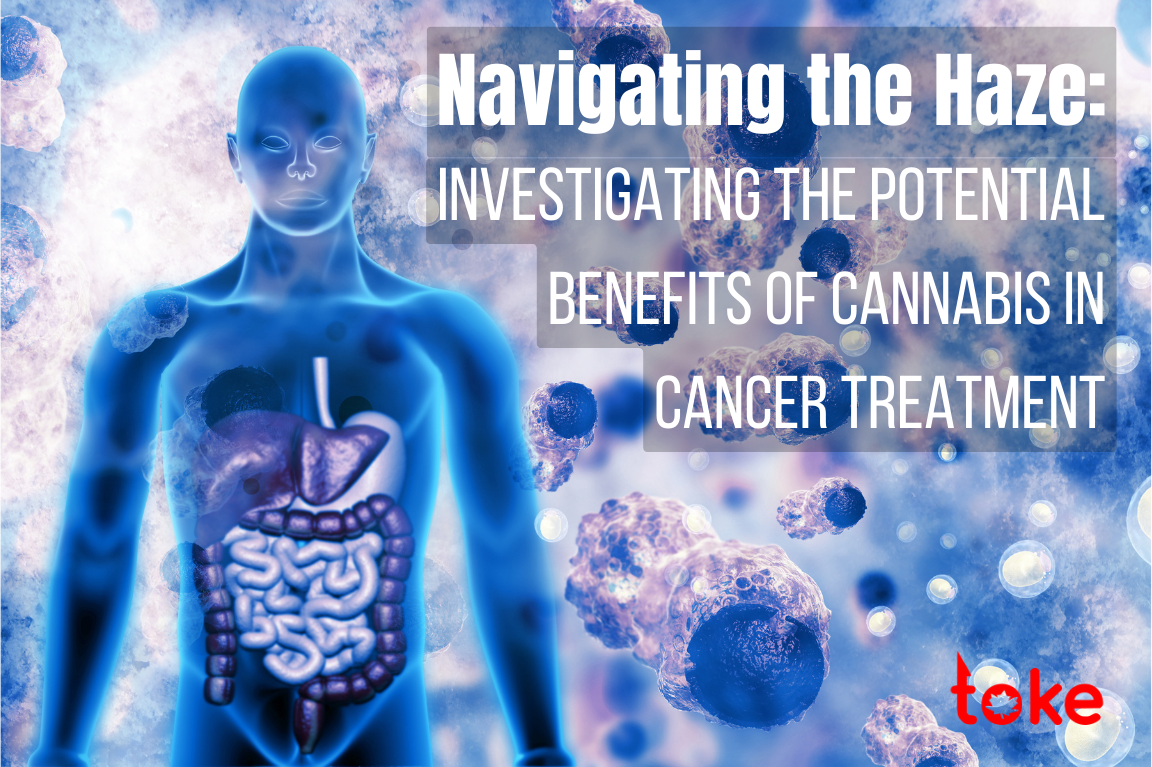Articles
Navigating the Haze: Investigating the Potential Benefits of Cannabis in Cancer Treatment
Introduction
As societal attitudes towards cannabis continue to evolve, there is an increasing interest in its potential as a treatment for cancer. In this article, we will delve into the current research surrounding cannabis and shed light on its potential benefits in cancer treatment.
Understanding Cannabis and Cancer
An introduction to cannabis
Cannabis has a rich history spanning centuries and has played a significant role in various cultures worldwide. Its different strains harbor unique chemical compositions, each with its own therapeutic potential.
Understanding cancer
Cancer, a complex disease, arises from the uncontrolled growth and division of abnormal cells within the body. Traditional treatment options for cancer, such as chemotherapy and radiation, have limitations and often result in harsh side effects.
The Science Behind Cannabis and Cancer
The endocannabinoid system and its role in the body
The endocannabinoid system, a complex network of receptors and molecules, plays a crucial role in regulating various physiological processes in the body. Cannabis interacts with this system, potentially influencing its functions.
Cannabinoids and their potential anti-cancer properties
Cannabinoids, the active compounds found in cannabis, have shown promise in their potential anti-cancer effects. THC, known for its psychotropic effects, impacts cancer cells in ways that inhibit their growth and proliferation. CBD, on the other hand, may offer benefits in cancer treatment without the psychoactive properties.
Current Research Findings
Cannabis and symptom management
Cannabis has shown effectiveness in alleviating pain and neuropathy, offering much-needed relief to cancer patients. It also demonstrates promise in mitigating chemotherapy-induced nausea and vomiting, enhancing the quality of life for individuals undergoing cancer treatment.
Cannabis and cancer cell growth
Research suggests that cannabinoids may possess anti-tumor effects, inhibiting cancer cell growth. They show potential in preventing cancer metastasis and angiogenesis, the process of new blood vessel formation that supports tumor growth.
Cannabis and treatment side effects
Utilizing cannabis in cancer treatment has shown promise in managing treatment-related side effects. It aids in reducing inflammation and promoting appetite, both of which are common challenges faced during the course of cancer treatment.
Clinical Trials and Medical Perspectives
Overview of ongoing clinical trials
Numerous clinical trials focusing on the use of cannabis in cancer treatment are currently underway. These trials highlight significant findings and aim to uncover the full potential of cannabis in the medical field.
Medical professionals’ perspectives on cannabis as a complementary therapy
Experts in the medical field are considering integrating cannabis into cancer treatment plans as a complementary therapy. They provide insights into the benefits, potential risks, and address concerns surrounding the use of cannabis in combination with traditional treatment methods.
Legal Considerations and Access to Cannabis
Global and regional legal frameworks for medical cannabis
The legal status of medical cannabis varies across countries and states, creating challenges in conducting research and accessing cannabis-based treatments for cancer patients.
Medical cannabis prescription and administration
Prescription processes and regulations surrounding medical cannabis have been established to ensure safe and appropriate usage. Additionally, different consumption methods have their own pros and cons, providing patients with various options for administration.
Patient Testimonials and Experiences
Personal stories of individuals using cannabis for cancer treatment
Numerous individuals have found relief and improved quality of life through cannabis-based treatments for cancer. These personal stories illustrate the positive impact cannabis can have on symptom management and overall well-being. However, it’s important to acknowledge the unique challenges and pitfalls that patients may face during their cannabis treatment journey.
Potential Risks and Adverse Effects
Discussion of potential risks and side effects associated with cannabis
While cannabis holds promise in cancer treatment, it is essential to note potential risks and adverse effects. Psychotropic effects and cognitive impairment are among the concerns, which must be weighed against the potential benefits.
Identifying vulnerable populations
Certain populations, such as the elderly or those with pre-existing conditions, may be more susceptible to the adverse effects of cannabis. It is crucial to establish safety precautions and considerations for these individuals when considering cannabis treatment.
Societal Stigma and Future Outlook
The stigma surrounding cannabis as a medical treatment
Historically, cannabis has faced societal stigma as a recreational drug, hindering its full exploration as a medical treatment. However, changing perceptions and increasing public acceptance are slowly eroding this stigma.
The future of cannabis in cancer treatment
Continued research advancements and breakthroughs hold significant promise for cannabis in cancer treatment. As public opinion shifts and public policies change, the integration of cannabis into standard cancer treatments may become more widespread.
Summary
In summary, the current research on cannabis and its potential benefits in cancer treatment is a topic of growing importance. Cannabis has shown promise in symptom management, controlling cancer cell growth, and mitigating treatment side effects. Ongoing clinical trials and medical professionals’ perspectives further contribute to our understanding of its potential value in cancer treatment.
FAQs
A. Is cannabis a cure for cancer? While some studies suggest that certain compounds in cannabis, such as cannabinoids, might have anticancer properties, there is currently no scientific evidence to support the idea that cannabis is a definitive cure for cancer. Research is ongoing, and more studies are needed to better understand the potential benefits and limitations of cannabis in cancer treatment.
B. How does cannabis compare to traditional cancer treatments? Cannabis should not be considered a replacement for traditional cancer treatments like chemotherapy, radiation, or surgery. Traditional treatments have undergone rigorous clinical trials and are based on well-established scientific evidence. Cannabis, on the other hand, is still being studied, and its role in cancer treatment is not fully understood. It’s important for individuals to work with their medical professionals to make informed decisions about their treatment plans.
C. Can cannabis replace chemotherapy or radiation? No, cannabis cannot replace chemotherapy or radiation. These treatments have specific mechanisms of action that target cancer cells. While some studies suggest that cannabis may have potential complementary effects in managing cancer symptoms or side effects of treatment, it is not a substitute for the targeted actions of chemotherapy or radiation therapy.
D. What are the legal implications of using cannabis for cancer treatment? The legal status of cannabis varies widely depending on the country and jurisdiction. In some places, medical cannabis use is legal and regulated, while in others it remains illegal. Patients considering using cannabis as part of their cancer treatment should be aware of the laws in their area and consult with medical professionals to navigate any legal and medical considerations.
E. Are there any standardized guidelines for the use of cannabis in cancer treatment? As of now, there are no universally standardized guidelines for the use of cannabis in cancer treatment. Due to the complexity of cancer and the variability in patients’ conditions, it’s challenging to establish one-size-fits-all recommendations. Patients interested in using cannabis should consult their oncologist or healthcare provider for personalized guidance based on their specific circumstances.
F. What research challenges exist in studying cannabis and cancer? Conducting research on cannabis and cancer poses several challenges. Regulatory barriers, limited access to quality-controlled cannabis products, and the complexity of studying the interactions between cannabis compounds and cancer cells all contribute to these challenges. Additionally, the lack of large-scale, controlled clinical trials makes it difficult to draw definitive conclusions about the efficacy and safety of cannabis in cancer treatment.
G. Are there any financial considerations related to cannabis treatment? Cannabis products can vary in cost depending on factors such as the type of product, dosage, and local regulations. Insurance coverage for medical cannabis may also be limited. Patients should be prepared for potential out-of-pocket expenses when considering cannabis as part of their cancer treatment plan. It’s important to discuss financial considerations with healthcare providers and explore available options.
** If you have any questions feel free to call us or text us at (778) 791-7063**
Buy weed online same day delivery in Vancouver, Downtown Vancouver, Yaletown, Coal Harbour, EastVan, Kitsilano, and North Vancouver British Columbia at Eastvan Buds Delivery

